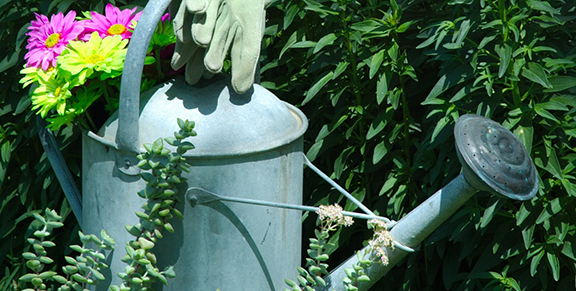I’m not sure when my love of gardening began. It seems to have always been a part of me. When I was a very young child I was often at my grandmother’s, but left in the care of the gardener and the cook. Both seem to have made an indelible impression on my young mind. I spent my mornings tagging along with Gabriel, inspecting, pruning, digging and learning. My afternoons were spent in the kitchen with Ceily, learning to bake pies.
As I grew so did my interest in gardening. I delighted in the ease of growing most anything in the rich soil and humid climate of New Orleans. Gardening there meant throwing a plant on the ground and maybe stepping on it to push it into the soil. Water was provided by the daily afternoon rainstorm. Nutrients had long since been deposited by delta floods. Life was easy in the Big Easy greenhouse.
Long after my grandmother and Gabriel had passed I found sustenance in gardening—I raised most of what we ate on a forty-acre farm. This connection to the source of life grew deeper with each spade full of dirt I turned. When I began growing vegetables I was as disconnected from my food source as most urbanites. The first year I grew a vegetable garden I had no idea how many tomatoes a tomato plant produced. Since I was planning to can tomatoes, I decided fifty plants should do. That year I learned two things about tomatoes: four tomato plants can feed a family of four and homemade tomato paste reduces tomatoes to the most concentrated form. I also developed more uses for tomato paste than Julia Child could imagine. We had tomato paste for five years from that first year’s garden.
Zucchini have a similar ratio. One healthy plant can provide as much zucchini as you’d care to eat in a season. There are only so many dishes you can put zucchini in. Most of what grows in a fifty-foot row of zucchini becomes food for the chickens.
I have grown just about every vegetable I could manage, from the basics to louffa sponges and asparagus. I discovered how beautiful okra is (it is a member of the Hibiscus family) and what delightful flowers a potato produces. Delicate sweet peas and sturdy corn, each standing a good seven feet tall, graced the garden. The voluptuous melons were truly an art form.
Most of my English peas never made it into the house as my children often dined alfresco. At first I fussed over getting the veggies to the table. But I soon realized that raw, right off the plant, was healthier and the kiddos were happier grazing. I gardened organically so they were free to pick and eat.
Surveying my freshly groomed garden, I marveled at the thought that our existence is due to six inches of topsoil. It was then that I realized that I am a steward of this land and not an owner. It was here long before my ancestors walked it and (hopefully) its topsoil would nourish those who followed my steps.
As life became more complicated, the garden became my refuge. I found calm in the daily chaos of careers and kids. No one ventured to disturb me in the garden. I was alone with my planet. My children will never know how many times I chopped them to pieces and buried them in the garden. Many times I entered the garden, shovel in hand, consumed with frustration or anger, only to leave calm and serene—or at least exhausted. And all this time my family and neighbors thought I looked so peaceful…gardening. The earth took all I could dish out and gave me beauty.
I have rarely used gloves in gardening. Part of the connection to this earth is the dirt on my hands. Lying on the grass brings me an eye-to-eye with mother nature. My hands sifting through the soil connect me to this element from which all life is dependent. I pay homage to the source of my being. My touch acknowledges the nourishment that I take from it.
This month I have expanded my herb garden. Once you cook with fresh herbs, you’ll never go back to dried. My herb garden is culinary. I haven’t ventured into medicinals. Sometimes I enter the herb garden on a warm afternoon just to pinch and whiff. It is the ultimate scratch-and-sniff experience. I take my granddaughter there to catch the scents and explore the tastes. Perhaps she will be a gardener too.
Gardening is about so much more than pretty flowers. Of course flowers are a big part of the gratification of gardening, but the real value is not in your real estate valuation. You may stop at the sight of colorful blooms and intoxicating scents, but the beauty is deeper than that. Plants are the elements that make life possible. They feed our flesh, clean our air, purify our water, cure our illnesses, soothe our souls, clothe our bodies, provide shelter from the elements, and give us shade on a sunny day.
We would do well to remember that we are not gardeners but caretakers.

